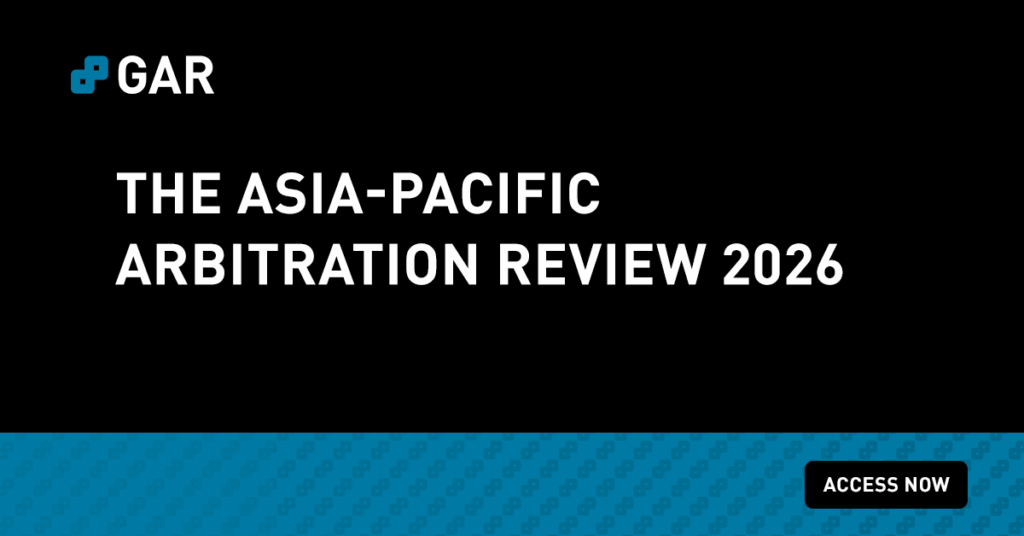
The Global Arbitration Review (GAR) has launched the Asia-Pacific Arbitration Review 2026. Duane Morris & Selvam’s Director Ramiro Rodriguez and Duane Morris’s Partner S. Saliya Subasinghe P.C. have contributed to this edition.
In summary
Mexico’s sweeping judicial reforms are expected to be implemented from June 2025. They may present formidable challenges, given the scale of the reforms as well as the size and importance of the country and its economy.
International arbitration may aid investors and trade partners doing business in or with Mexico. Investors should thoughtfully structure transactions to mitigate risks, given the potential difficulties in enforcement of international arbitral awards in Mexico.
Singapore may also play a role in assisting parties to mitigate such risks. International parties doing business in or with Mexico may choose to govern their contracts by Singaporean law, choose Singapore as the seat of arbitration, obtain third-party guarantees or security in Singapore, choose SIAC or any other reputable arbitral institution to administer their arbitrations, and avail themselves of any benefits under international treaties or agreements.
Discussion points
- Mexican judicial reforms
- Structuring transactions to mitigate risks
- Singapore as a seat of international arbitration
Referenced in this article
- Anupam Mittal v Westbridge Ventures II Investment Holdings [2023] SGCA
- Queen Mary and White & Case 2025 International Arbitration Survey, 6th edition
- Asiana Airlines Inc v Gate Gourmet Korea Co Ltd [2024] SGCA(I) 8
- Sun Travels & Tours Pvt Ltd v Hilton International Manage (Maldives) Pvt Ltd [2019] SGCA 10
- Larsen Oil & Gas Pte Ltd v Petropod Ltd [2011] 3 SLR 414
- Swire Shipping Pte Ltd v Ace Exim Pte Ltd [2024] SGHC 211
- Arab Banking Corp (BSC) v Boustead Singapore Ltd [2016] 3 SLR 557 at [64]
- GHL Pte Ltd v Unitrack Building Construction Pte Ltd and another [1999] 3 SLR(R) 44
The reforms and concerns
In September 2024, Mexico’s Congress passed sweeping reforms to its judiciary with the stated view to cleanse the judiciary of corruption. As a result, Mexican voters will elect judges by popular vote to replace all sitting judges. The overhaul is expected to begin in June 2025 and be completed by 2027.
Governments, international bodies and legal practitioners around the world have expressed concerns about the reforms, including:
- judicial candidates will not be subject to examinations to assess a minimum standard of knowledge and skill;
- popular elections may adversely impact the independence of the judiciary due to the pressure that external agents (eg, political parties and even organised crime) may exert over the elections;
- the election of judges by popular vote at the national level is not common around the world. Only a handful of countries elect judges popularly, including the United States of America and Switzerland. But they do not do so at the federal level. Bolivia has enacted a similar system, which according to available reports has not worked well;[1] and
- the reforms are a high-stakes experiment for Mexico and the region. Mexico is a large country with a population of around 130 million,[2] one of the top 15 largest economies in the world[3] and the United States’ largest trading partner.[4]
The role of arbitration
The judicial reforms have sown uncertainty, regardless of the eventual outcome. Therefore, legal practitioners have been actively discussing the potential role of arbitration in light of the reforms.[5] Below are some key takeaways.
- International companies should attempt to obtain guarantees or security outside of Mexico from Mexican counterparties. This would bypass the necessity of enforcing an award in Mexico. Leading Mexican legal practitioner Fernando Elias-Calles explains that the enforcement of an arbitral award in Mexico has been subject to strict scrutiny by Mexican judges even prior to these reforms. Such scrutiny is particularly focused on ensuring that the Mexican counterparty is properly served in a manner that is consistent with the due process standards outlined in Mexican law. The Mexican Commercial Code gives wide powers to judges enforcing awards in Mexico to ensure that service of the notice of arbitration on Mexican counterparty is compliant with Mexican standards. Mexico’s federal system could also result in different judges being involved in the enforcement of an award on assets located across various states. Mexico’s international arbitration enforcement situation could actually improve with the new judges, but it may take years before we know that.
- Commentators have noted that Mexico is likely not be a preferred seat of arbitration, except as required by mandatory laws.
- International parties are likely to increase the use of commercial arbitration when dealing with Mexican counterparties.
All these points lead us to the next question.
Does Singapore have a role to play?
Possibly, yes. There are various angles to consider.
Singapore as a seat of arbitration and governing law
Asian companies entering into contracts with Mexican (and other Latin American and international) counterparties often choose Singapore law as the governing law of the contract and of the arbitration agreement. They likewise often choose Singapore as the seat of arbitration. Mexico’s judicial reforms may accelerate this trend.
Singapore commercial law is based on and is still similar to English law, but has developed independently over the last few decades. A discussion on Singapore commercial law is beyond the scope of this article. Suffice to say that it usually governs international commercial transactions, especially when at least one Asian party is involved. This is perhaps due to its clarity, stability and laissez-faireapproach to commercial dealings.
As the law governing an arbitration agreement, Singapore is the first port of call to determine the arbitrability of a dispute.[6] This provides a high level of comfort that a commercial dispute is arbitrable, as there are only a few public policy restrictions to arbitrability under Singapore law.
Singapore is regarded as one of the top arbitration seats in the world,[7] and for good reason. Courts routinely issue pro-arbitration judgements, swiftly grant or uphold anti-suit injunctions,[8] broadly interpret arbitration clauses to cover a wide range of disputes,[9] and uphold the principle of minimal curial intervention in arbitral awards.[10]
Singapore may play a role in assisting parties to mitigate such risks. International parties doing business in or with Mexico may choose to govern their contracts by Singaporean law, choose Singapore as the seat of arbitration, obtain third-party guarantees or security in Singapore (or any other investor-friendly jurisdiction), choose SIAC or any other reputable arbitral institution to administer their arbitrations and avail themselves of any benefits under the CPTPP or any other international treaties or agreements.
* Special thanks to Fernando Elias-Calles and his team for the input on Mexican law. All mistakes, however, are ours alone.
Obtaining and enforcing security in Singapore
Where possible, parties should obtain from Mexican counterparties some form of security or corporate guarantee sourced out of Singapore (or any other investor-friendly jurisdiction) to ensure that any arbitral award may be enforced outside Mexico.
Singapore courts also have a good record in recognising and enforcing both arbitral awards and guarantees/security. For instance, Singapore courts routinely enforce bank guarantees and performance bonds, except in instances involving fraud or unconscionability.[11]
The Singapore International Arbitration Centre as an institution managing the arbitration
The Singapore International Arbitration Centre (SIAC) has become a globally important arbitration centre, with a presence in the Americas.
SIAC’s newly updated 2025 rules offer a variety of cost- and time-efficient options to conduct the proceedings. These include a streamlined procedurein which the award must be issued within three months from the constitution of the tribunal for disputes not exceeding S$1 million andanexpedited procedure in which the award must be issued within six months for disputes not exceeding S$10 million. The SIAC rules likewise contain useful provisions for emergency arbitrations, early dismissal of unmeritorious claims and preliminary determination of issues, all of which aim at the expeditious and cost-effective conduct of the arbitration.
Adoption of the SIAC rules by Mexican parties could therefore address concerns around efficiency of arbitration proceedings.[12]
The Comprehensive and Progressive Agreement for Trans-Pacific Partnership
The Comprehensive and Progressive Agreement for Trans-Pacific Partnership (CPTPP) is a significant free trade agreement originally entered into by 11 countries from both sides of the Pacific, including Mexico, Singapore, Japan, Canada, Australia and Vietnam. In December 2024, the United Kingdom formally joined the CPTPP.[13]
Chapter 9 of the CPTPP contains a number of detailed provisions on arbitration, including a number of limitations by Mexico on its consent to arbitrate a number of matters under the CPTPP’s provisions.
Businesses trading with or investing in Mexico through Singapore should therefore be aware of the protections and limitations under the CPTPP.
Conclusion
Mexico’s judicial reforms may present formidable challenges, given the scale of the reforms as well as the size and importance of the country and its economy.
International arbitration may potentially aid investors and trade partners doing business in or with Mexico. However, investors should thoughtfully structure transactions to mitigate risks, given the potential difficulties in enforcement of international arbitral awards in Mexico.
Endnotes
[1] https://www.icj.org/bolivia-new-report-highlights-shortcomings-and-challenges-of-judicial-independence/.
[2] https://www.cia.gov/the-world-factbook/countries/mexico/#people-and-society.
[3] https://data.worldbank.org/indicator/NY.GDP.MKTP.CD?most_recent_value_desc=true.
[4] https://www.census.gov/foreign-trade/statistics/highlights/topcm.html.
[5] See, for instance, https://www.perezllorca.com/wp-content/uploads/2024/10/241101-NJ-El-Arbitraje-como-potencial-remedio-ante-las-Reformas-Constitucionales-en-Mexico.pdf.
[6] See Anupam Mittal v Westbridge Ventures II Investment Holdings [2023] SGCA. Foreign public policy may also be relevant in specific circumstances even if the arbitration agreement is governed by Singapore law.
[7] See Queen Mary and White & Case 2025 International Arbitration Survey, 6th edition (2025 International Arbitration Survey – The path forward: Realities and opportunities in arbitration | White & Case LLP).
[8] But without overreaching. See Asiana Airlines Inc v Gate Gourmet Korea Co Ltd [2024] SGCA(I) 8 where theSingapore Court of Appeal set aside an anti-suit injunction against a non-party to an arbitration agreement but clarified when such an injunction could be granted and Sun Travels & Tours Pvt Ltd v Hilton International Manage (Maldives) Pvt Ltd [2019] SGCA 10 where in the Singapore Court of Appeal set a generous standard for granting anti-suit injunctions but refused to do so when the foreign proceedings where at an advanced stage.
[9] Larsen Oil & Gas Pte Ltd v Petropod Ltd [2011] 3 SLR 414.
[10] Swire Shipping Pte Ltd v Ace Exim Pte Ltd [2024] SGHC 211 .
[11] See, for instance, see Arab Banking Corp (BSC) v Boustead Singapore Ltd [2016] 3 SLR 557 at [64] and GHL Pte Ltd v Unitrack Building Construction Pte Ltd and another [1999] 3 SLR(R) 44.
[12] https://arbitrationblog.kluwerarbitration.com/2025/01/14/mexico-judicial-reform-is-arbitration-going-to-be-the-one-that-saves-us/.
[13] https://commonslibrary.parliament.uk/research-briefings/cbp-9121/ – Mexico and Canada are yet to ratify the UK’s accession to the CPTPP.
